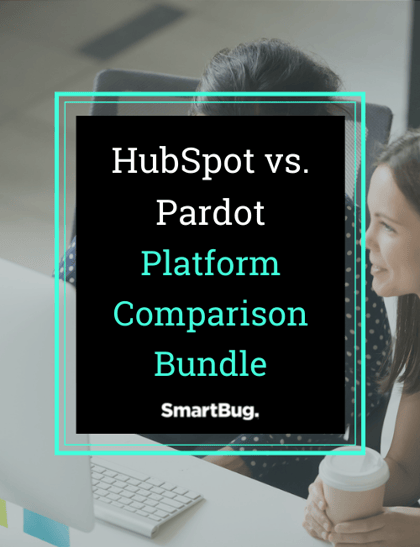HubSpot vs. Pardot

Convinced HubSpot is the right tool for your organization, but need to get your team on board?
This bundle is tailored to marketers who are convinced HubSpot is the right fit for their organizations’ needs but whose teams don’t fully back them up. If this is you, we’ve got the perfect tools to help you get HubSpot buy-in.
Still hesitant about making the switch to HubSpot?
This bundle is also made with you in mind. Our team of digital marketing experts has compiled a list of Pardot and HubSpot features and how they compare.

This bundle will allow you to:
- Find the right platform for your organization’s needs
- Identify and compare both platform’s features
- Move the conversation in the right direction and ultimately get what you need ... HubSpot
All businesses are different. What works well for others, even in the same industry, might not work well for you. The HubSpot versus Pardot battle comes down to a simple question: Which platform will lift work off of your marketing team, offer you the most value, and drive the most conversions?
In the bundle you'll find:
Pardot Audit Framework (Google Sheet)
Platform Comparison Chart (PDF)
Access to other related content
What is the biggest difference between HubSpot vs. Pardot?
HubSpot and Pardot are two popular marketing automation platforms that have a lot of similarities but also some key differences. One of the biggest differences between the two is that HubSpot includes a full suite of marketing, sales, and service tools, whereas Pardot focuses solely on marketing automation.
HubSpot's all-in-one approach means that users have access to everything they need in one place, from CRM and email marketing to social media management and landing pages. This can make it easier to manage your entire marketing strategy from a single platform.
Pardot, meanwhile, is designed specifically for B2B marketers who want to streamline their lead generation and nurturing efforts. It doesn't offer the full range of tools that HubSpot does, but many users appreciate its deep customization options and tight integration with Salesforce.
What are the key features of Pardot?
- Lead generation and nurturing: Pardot makes it easy to capture leads through forms, landing pages, and other channels. Its lead nurturing capabilities allow you to send targeted emails and ad campaigns to move prospects through the funnel.
- Email marketing: Pardot's email marketing tools include customizable templates, A/B testing, and automated drip campaigns. You can also track opens, clicks, and other engagement metrics.
- Lead scoring and grading: With Pardot, you can assign scores to leads based on their behavior and demographic information. This helps you prioritize your follow-up efforts and focus on the most promising opportunities.
- ROI tracking: Pardot provides analytics and reporting features that allow you to track the ROI of your marketing campaigns, including email, social media, and paid advertising.
Salesforce integration: Because Pardot is part of the Salesforce ecosystem, it integrates seamlessly with Salesforce CRM. This allows you to track leads through the entire sales process, from initial contact to close. - Customization and configuration: Pardot offers a high degree of customization and configuration options, allowing you to tailor the platform to your specific needs. You can also use the Pardot API to connect with other applications and systems.
What are the key features of HubSpot?
HubSpot offers all the same Pardot features listed above in addition to a seamless all-in-one CRM platform with the following features:
- Marketing Hub: HubSpot's Marketing Hub offers a range of tools for inbound marketing, including lead generation, email marketing, SEO optimization, social media management, analytics, and more.
- Sales Hub: HubSpot's Sales Hub provides sales teams with tools for lead tracking, pipeline management, email templates, document tracking, and more.
- Service Hub: HubSpot's Service Hub helps teams manage customer support tickets, create knowledge bases, automate chatbots, and streamline feedback collection and reporting.
- CRM: HubSpot's free CRM integrates with all of its hubs, providing users with a single place to manage customer data, track interactions, and view pipeline progress.
- Automation: HubSpot's automation capabilities help you streamline your sales and marketing processes with workflow automation, lead scoring, and custom triggers.
- Reporting and analytics: HubSpot provides in-depth reporting and analytics features across all its hubs, allowing you to track performance, identify trends, and measure ROI.
- E-commerce: HubSpot's e-commerce capabilities allow you to create an online store, manage inventory and shipping, and track sales and revenue within the platform.
- CMS: HubSpot's CMS is a powerful tool for building and managing your website with drag-and-drop design, customizable templates, and built-in SEO optimization.
Note: Not all features are listed. To learn more, you can visit HubSpot’s website.
How do I choose a marketing automation platform?
When it comes to choosing a marketing automation platform, there are several factors to consider:
- Your budget: Marketing automation platforms can range from a few hundred dollars to tens of thousands of dollars per month, so it's important to determine what you can afford.
- Features: Consider the features you need in a platform. Some platforms offer basic email marketing and lead capture tools. Others offer more advanced features such as lead scoring, CRM integration, and social media management.
- Ease of use: Look for a platform that is easy to use and has a user-friendly interface. You don't want to spend more time trying to figure out how to use the platform than actually using it.
- Integration: Make sure the platform can integrate with your existing systems, such as your CRM, email marketing software, and other tools you use.
- Support: Choose a platform that offers good customer support, including online help resources, live chat, and phone support.
By taking these factors into consideration, you can make the right decision about a marketing automation platform that fits your business needs and helps you achieve your marketing goals.
If you are deciding between HubSpot vs. Pardot, be sure to check out this article.
How will you use my personal information?
We may use or disclose the personal information we collect for one or more of the following business purposes: To provide you with information, products, or services that you request from us. To provide you with email alerts, event registrations, and other notices concerning our products, services, events, and news that may be of interest to you. To carry out our obligations and enforce our rights arising from any contracts entered into between you and us, including for billing and collections. To carry out our obligations and enforce our rights arising from any contracts entered into with our clients. To improve our website and present its contents to you. For testing, research, analysis, and product development. As necessary or appropriate to protect the rights, property, or safety of us, our clients, or others. To respond to law enforcement requests and as required by applicable law, court order, or governmental regulations. As described to you when collecting your personal information or as otherwise set forth in the CCPA.
We will not collect additional categories of personal information or use the personal information we collected for materially different, unrelated, or incompatible purposes without providing you notice.
Understand which platform best fits your needs
Just fill out the form below and access your bundle